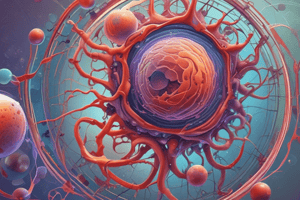Podcast
Questions and Answers
Which type of lymphocyte is involved in nonspecific immune defense?
Which type of lymphocyte is involved in nonspecific immune defense?
- Dendritic cells
- NK cells (correct)
- B cells
- T cells
Phagocytosis is a specific immune response.
Phagocytosis is a specific immune response.
False (B)
What is the term for the process by which B cells produce many identical antibody-producing cells?
What is the term for the process by which B cells produce many identical antibody-producing cells?
Clonal expansion
The production of antibodies starts when B cells are exposed to free, or extracellular, ______________________.
The production of antibodies starts when B cells are exposed to free, or extracellular, ______________________.
What is the second most abundant antibody in serum?
What is the second most abundant antibody in serum?
Match the following immunoglobulins with their functions:
Match the following immunoglobulins with their functions:
Normal flora helps protect the body from pathogens.
Normal flora helps protect the body from pathogens.
Which of the following is NOT a characteristic of cellular immunity?
Which of the following is NOT a characteristic of cellular immunity?
Treg cells can produce TNF-alpha.
Treg cells can produce TNF-alpha.
What is the role of Tregs in the immune system?
What is the role of Tregs in the immune system?
The ability of an organism to resist infections by pathogens is called ____________________
The ability of an organism to resist infections by pathogens is called ____________________
Match the following types of vaccines with their characteristics:
Match the following types of vaccines with their characteristics:
Which of the following vaccines are used for preventing viral diseases?
Which of the following vaccines are used for preventing viral diseases?
Recombinant vaccines need a cell or animal host to grow the vaccine's microbe.
Recombinant vaccines need a cell or animal host to grow the vaccine's microbe.
Who developed the first vaccine against Rabies virus?
Who developed the first vaccine against Rabies virus?
Flashcards are hidden until you start studying
Study Notes
Phagocytosis and Fever
- Phagocytosis is a process that involves four main phases: chemotaxis, adherence, ingestion, and digestion.
- The release of histamine, kinins, and prostaglandins causes phagocytosis and fever.
Innate Immune Cells
- Macrophages, eosinophils, dendritic cells, and NK cells are all innate immune cells.
- Monocytes, neutrophils, and mast cells are also innate immune cells.
Nonspecific Chemical Barriers
- Lysozyme in saliva is an example of a nonspecific chemical barrier to infection.
Normal Flora
- Normal flora help protect the body from pathogens by competing with them for space and resources.
Nonspecific Immune Defense
- NK cells are involved in nonspecific immune defense.
- Neutrophils are capable of phagocytosis.
- Phagocytic cells are cells that ingest pathogens.
Antibody Production
- Production of antibodies starts when B cells are exposed to free, or extracellular, antigens.
- B cells can carry at least 100,000 identical immunoglobulin molecules embedded in their surface membranes.
Immunoglobulins
- IgA and IgM are two immunoglobulin classes that have a J chain.
- Opsonins are any substances that promote phagocytosis of antigens by binding to them.
- Clonal expansion is the phenomenon of selective proliferation of B cells in response to their interaction with an antigen.
- IgA is the second most abundant antibody.
- IgE is the immunoglobulin that mediates allergic reactions.
- The order of percentage of total immunoglobulin in serum is IgG, IgA, IgM, IgE, IgD.
Antigen-Presenting Cells (APCs)
- Activated macrophages, dendritic cells, and B cells are all APCs that process the antigen and present it on their surface together with an MHC molecule.
Tregs
- Tregs control the immune response to self and foreign particles and help prevent autoimmune disease by suppressing T cells that escape deletion in the thymus.
- Tregs do not produce TNF-alpha.
- A deficiency in Tregs could result in autoimmunity.
Cellular Immunity
- Cellular immunity is characterized by the activity of T cells, not B cells.
- M cells are not lymphocytes.
Vaccines
- Recombinant vaccines and DNA vaccines do not need a cell or animal host to grow the vaccine's microbe.
- MMR and DTP are examples of vaccines used to prevent viral diseases.
- It is acceptable to give a live attenuated viral vaccine to children under 8 years of age.
- Immunity is the ability of an organism to resist infections by pathogens.
- Vaccination is a method of active immunization.
- The first vaccine developed by Louis Pasteur was against the rabies virus.
Studying That Suits You
Use AI to generate personalized quizzes and flashcards to suit your learning preferences.




